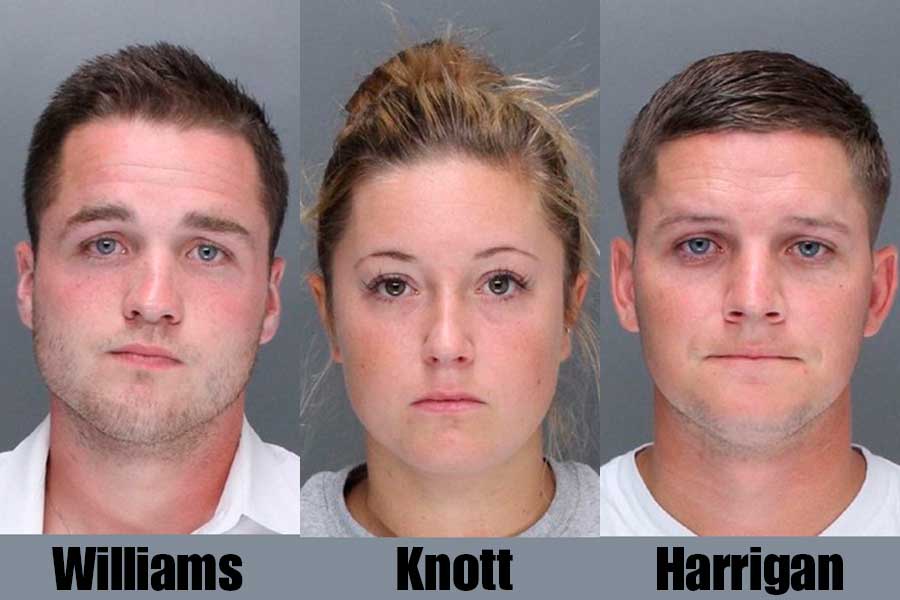Three days after he was sworn in as the city’s top law-enforcement officer, District Attorney Larry Krasner ousted several-dozen employees, including the attorney who prosecuted a high-profile gay-bashing attack.
Three staffers and 28 assistant district attorneys were forced to resign Jan. 5 in what Krasner’s office referred to as a “broad reorganization of the structure of the DAO” intended to bring “culture change.”
Veteran prosecutor Mike Barry was among those forced out. Barry spent nearly 19 years with the D.A.’s Office, and most recently was known among the local LGBT community as lead counsel on the D.A.’s case against Kathryn Knott, Phillip Williams and Kevin Harrigan. The trio was prosecuted for the September 2014 attack on gay couple Zachary Hesse and Andrew Haught.
Barry joined the office in March 1999, spent six years in the Homicide Unit and was named chief of the Central Bureau in 2010. Among his most notable cases, Barry prosecuted former police officer Frank Tepper for a 2009 murder and Mustafa Ali for the 2008 double murder of two retired cops.
Barry said he received a call last Friday to report to the office, despite that it was closed due to snow. Police assigned to the office met Barry in the lobby and escorted him to the human-resources department. The HR director then told him Krasner wanted his letter of resignation by Jan. 8, or else he would be terminated.
“I was informed of when my last paycheck would be issued and when my benefits would end,” Barry said, adding that no severance package was offered to any of the ousted employees. “I was then escorted by police to my office where they waited while I was allowed to pack my personal belongings in my office. I was escorted to my office lobby and told I could not go back up.”
A number of news cameras outside the office Friday afternoon filmed the ADAs carrying out their belongings.
“The experience of leaving was humiliating and infuriating. It was completely out of character for that office, which had treated me fairly for 18 years.”
The staffers forced out were not given any explanation for why they were chosen, Barry said. He added that he was among a group of about eight people who met with Krasner and another member of his team shortly after the election in November, but that he’d had no interaction since.
“I did not speak to anyone in leadership after that, including once they took office and not on the day I was let go,” Barry said.
Most recently, Barry was the deputy district attorney of the Pretrial Division. As a higher-ranking official, he said he was cognizant that termination during the transition was a possibility. However, he said, he thought his record would have been compatible with the goals of Krasner, who ran as a reformer.
“In particular, I thought there’d be a place for me, as I had worked almost entirely over the past two years on criminal-justice-reform projects and had handled numerous cases that were important to progressives,” including Tepper’s prosecution and the gay-bashing case, he noted.
In that case, Harrigan and Williams accepted plea deals that involved probation and community service, which Barry helped negotiate with input from the victims, while Knott took her case to trial. Barry and ADA Allison Ruth shared responsibilities during Knott’s four-day trial in December 2015, with Barry taking on tasks such as the cross-examination of Knott — in which he grilled her about her involvement in the incident and her history of antigay social-media postings — and the 80-minute closing statement.
Katherine Knott convicted on four counts
Though the defendants were not charged with a hate crime, Barry repeatedly emphasized the anti-LGBT nature of the attack during the trial.
He later spoke at a number of LGBT events on criminal justice and other topics.
Shortly after Knott’s trial, Barry took on the deputy position, so he has been focusing on more top-level reforms instead of an active caseload.
“I was in the middle of working with a lot of other city agencies on numerous criminal-justice-reform projects, including pre-arrest police diversion for drug-possession cases, implicit-bias training and ongoing efforts to reduce the prison population,” he said. “I would have liked to have seen all that work through.”
Knott, Harrigan and Williams remain on probation. Barry said he doesn’t foresee any likely probation violations before their terms are up but, if so, he’s confident Ruth, who is still employed at the D.A.’s Office, would “pick the matter back up and handle it as professionally and zealously as we did when we tried the case.”
Ben Waxman, Krasner’s newly named director of communications, declined to confirm Barry’s forced resignation to PGN, saying that the office was not “providing individual names or confirmation for those who were asked to resign out of respect for their privacy.” It is unclear if Cameron Kline, the openly gay former director of communications for the D.A., is still employed by the office.
A prepared comment from the office stated that “[Krasner] made clear his intention to take the office in a different direction. Reorganization and a change in some key personnel are necessary to fulfill that promise.”
Barry said he is still figuring out his next move, but hopes to return to the courtroom in the future.
“This is going to be a very difficult time for the [D.A.’s] office,” Barry added. “But the work they do there is so important, I am doing nothing but hoping they succeed.”
PGN 2015 People of the Year: Mike Barry and Allison Ruth
